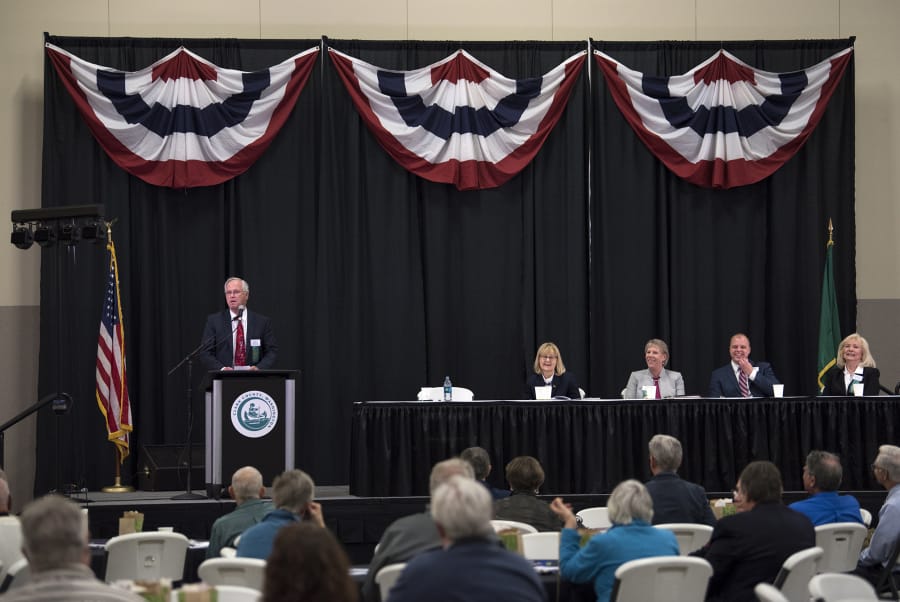Land-use planning, the dilapidated jail, social service funding and improvements to trails and sidewalks.
These were all either challenges or accomplishments that members of the Clark County Council outlined at the 2018 State of the County event. More than 100 people gathered Tuesday in a hall at the Clark County Event Center at the Fairgrounds to munch on popcorn and hear speeches from councilors that highlighted the county’s economic growth, maintaining the area’s quality of life and county services often taken for granted.
“The state of the county would not be complete without a few words about growth management,” said Council Chair Marc Boldt, referring to the county’s comprehensive planning requirements under state law.
Boldt said that with the exception of La Center and Ridgefield, there is very little land available for growth. The county is currently in court trying to establish a rural industrial land bank in the county. He said that if the county loses its case, lot prices will continue to rise. Addressing the problem, he said, will require cooperation between the county and small cities.
He also called attention to the county’s rising cost of providing constitutionally required defense to people too poor to afford a lawyer. He said that last year, the county spent $6 million on the service, with little help from the state, and costs are expected to rise.
Councilor Jeanne Stewart, who noted that she represents large swaths of Vancouver, highlighted how relations between the county and city had improved on issues regarding homelessness, housing and mental health. Stewart also noted that the county is in a strong position for economic growth.
“As we develop financial opportunities, we can never forget what we have here now, our quality of life that provides us with this most wonderful place to live,” she said.
Councilor Julie Olson called attention to the outdated and overcrowded jail and how the council earlier in the day had appointed a commission to come up with a recommendation for the facility. She said that the county will need to balance the cost and the need for a safe and effective facility going forward.
“When we talk about public safety, most of us think about law enforcement, but the county does strive to keep our community safe in other ways as well,” said Olson.
She said the county typically only builds half a mile of sidewalks a year. But she highlighted how the council recently directed an additional million to its sidewalk program that she said will make the county safer and more livable.
Olson also said that there is high demand for walking and hiking, but the county has built only 46 of the 217 miles of trails it’s planned for. She said she hopes she lives long enough to see the completion of the planned Lewis & Clark Discovery Greenway Trail, which will provide 50 miles of continuous trail from north of Ridgefield to Washougal.
Councilor John Blom called attention to how the county’s Community Services Department will receive more than $600,000 in state funding to build a triage and stabilization center where people experiencing a mental health episode can receive services instead of being taken to the jail or the emergency room.
Blom mentioned the council’s work to expand housing options and the county’s homeless services. He said that for a period encompassing most of last year, the county assisted more than 6,500 people experiencing homeless with financial support for shelter, emergency hotel vouchers and the day center.
“The need is great, but we are a compassionate community,” he said.
Councilor Eileen Quiring echoed remarks made earlier that maintaining the county’s livability, through parks and other services, is key to economic growth.
“Another key is to foster a regulatory environment that encourages economic development, not hampering business with unproductive and unnecessary regulations” she said.
She mentioned the county’s plans to allow freight-dependent development along the Chelatchie Prairie Railroad, which could be allowed by a change in what she called the state’s “onerous” growth management law. She said the county is currently crafting development regulations that will address neighbors’ concerns but not stifle the “much-needed economic development.”




